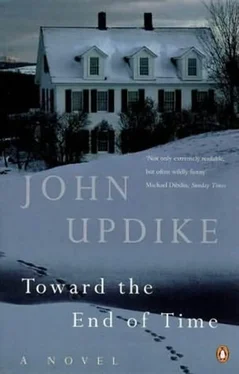John Updike - Toward the End of Time
Здесь есть возможность читать онлайн «John Updike - Toward the End of Time» весь текст электронной книги совершенно бесплатно (целиком полную версию без сокращений). В некоторых случаях можно слушать аудио, скачать через торрент в формате fb2 и присутствует краткое содержание. Жанр: Современная проза, на английском языке. Описание произведения, (предисловие) а так же отзывы посетителей доступны на портале библиотеки ЛибКат.
- Название:Toward the End of Time
- Автор:
- Жанр:
- Год:неизвестен
- ISBN:нет данных
- Рейтинг книги:3 / 5. Голосов: 1
-
Избранное:Добавить в избранное
- Отзывы:
-
Ваша оценка:
- 60
- 1
- 2
- 3
- 4
- 5
Toward the End of Time: краткое содержание, описание и аннотация
Предлагаем к чтению аннотацию, описание, краткое содержание или предисловие (зависит от того, что написал сам автор книги «Toward the End of Time»). Если вы не нашли необходимую информацию о книге — напишите в комментариях, мы постараемся отыскать её.
Toward the End of Time — читать онлайн бесплатно полную книгу (весь текст) целиком
Ниже представлен текст книги, разбитый по страницам. Система сохранения места последней прочитанной страницы, позволяет с удобством читать онлайн бесплатно книгу «Toward the End of Time», без необходимости каждый раз заново искать на чём Вы остановились. Поставьте закладку, и сможете в любой момент перейти на страницу, на которой закончили чтение.
Интервал:
Закладка:
I held my ground there on the tilted path and said, in the face of Paul’s increasing agitation, “Surely the Law was not given to Moses and our priests to be a curse, but to keep us clean among the unclean, to keep us distinct in our covenant. If Christ annulled the Law as thoroughly as you say, then virtue is what each man says it is, and righteousness becomes mere self-proclamation. The Gentiles will come to Christ as if walking from one room into another, without humility or ritual, without discipline or pain.”
Paul’s eyes surrendered all their craft to a blaze of passion: he held out his arms as if he stood before us crucified. “I have been stoned and flogged,” he said, “for proclaiming Christ’s victory in love. I have forsaken in this life all shelter and safety. Yet, my doubtful young friend, I rejoice in my suffering. Those who belong to Jesus crucify their flesh. They die to this world, that they may live in the Spirit. What matters circumcision then? What matters cleanness, and the manner of meat, which, as our Lord has said, all goes out through the bowels! I say to you as I said to Peter when in Antioch he flinched from eating with the Gentiles: You hypocrite! Jew and Gentile are one in Christ! I say to you that no man who puts his hand to the plow yet turns back is fit for the kingdom of God!”
Barnabas tried to intervene, wounded to see such hard words used on his young cousin. But I felt freed from deference by Paul’s fury and intemperance, and justified in my suspicion that he was twisting the Master’s Word in his passion to convert the world, to make everyone and no one a Jew. Participating in Stephen’s death, and hearing that martyr curse the stiff-necked people who had ever persecuted their prophets, Saul had taken into himself hatred of the Jews, though he himself was the disputatious and hot-blooded quintessence of one. When our tempers had somewhat cooled, and we had partaken together of a handful of olives and some hard bread softened in a nearby freshet, there in that shadowed pass an hour’s climb north of Perga, Barnabas arranged with me to descend to Attalia and take passage back to Caesarea and Jerusalem. He loved me, yet believed that he had been commissioned by the church at Antioch to accompany Paul and must do it even though it lead to death.
Also, I think, he scented glory in Paul’s path.
Others have written of what befell them in the cities of southern Galatia. They passed safely through unseen bandit gangs and late blizzards in the wild region around the Cilician Gate, through the canyon worn by the Kestros. They made their way along the heights to the east of the vast blue lake and the great mountain, Sultan Dagh, beyond. In Antioch, where some of the citizens were given to the worship of the Persian god Mithras and others to the lewd goddess Cybele, Paul fell prey to blinding headaches and spells of feverish debility, but made many converts among the pagans; then the priests, waxing jealous, drove him and Barnabas from the city with a scourging. In Iconium, Paul met Thecla, and his heated words seduced her to tread the path to martyrdom. Again, after much fruitful preaching to the Gentiles, he was driven from the city by the Jews, who represented to the Roman authorities that Paul urged not only heresy but subversion, claiming that a certain King Jesus was the true ruler of the eastern Empire.
In Lystra, Paul healed a cripple, and the ignorant people hailed him and Barnabas as Mercurius and Jupiter and would have even worshipped them as gods had not Paul rebuked their superstition. There were few Jews in Lystra, but elders came from Antioch and Iconium and persuaded the people to stone Paul; he who had helped stone Stephen was left for dead outside the city, but by a miracle survived. He and Barnabas went on to the village of Derbe, where they founded the last of the Galatian churches, and returned to Attalia and thence to Antioch by the same way they had come, westward through Lystra and Iconium and the Pisidian Antioch, visiting the Christian congregations they had engendered there despite the enmity and persecutions of the Jews, who could not but think their initial hospitality had been betrayed and their ancient covenant cheaply assigned to a multitude of the uncircumcised-to Roman soldiers and Greek tanners, to women and slaves, to Asians and Cappadocians, Phoenicians and Scythians, to legions of barbarians hitherto mired in superstition and the pleasures of the flesh.
Though Paul’s missions took him ever farther afield, to Thessalonica and Berera in Macedonia, to Athens and Corinth in Achaia, to Ephesus until driven thence by an uproar among the silversmiths whose trade in idolatrous images of Diana was threatened by his preaching, and some say even to Spain and, by my own certain witness, to Rome-in spite of all these travels the Galatian churches remained the dearest of his children, being the firstborn, and the object of the first of his epistles which have been circulated and preserved.
Myself, John Mark, known in manhood by my Latin appellation, in time I reconciled with Paul. Nearly twenty years after we parted angrily above Perga, I was with him and Peter in Rome. Our congregation there, beseiged and small, had long been promised a visit by him; he sent ahead of him a long and eloquent letter, as a spiritual gift, speaking many things of Christ. In Rome Paul was a prisoner for two years, writing and receiving all who came to him for instruction and inspiration. Cities are unholy places, but their mobs were needed for the spread of the Word. In country air Christ’s message melted into birdsong. Rome was Antichrist’s capital, and its capture essential to our campaign. I had been in Rome some years previous, as Peter’s interpreter and secretary, before Paul was brought there. It was then that I began, in my rough Greek, to set down those things I had heard of the life of Jesus.
Paul and Peter together met martyr’s deaths under Nero Claudius Caesar, who, goaded into ever greater infamies and follies by his evil wife, Poppaea, blamed the Christians for the conflagration which many whispered had been set by his own hand. Peter was crucified upside down, in mockery; Paul as a Roman citizen was cleanly beheaded, three miles outside the city wall, in the Salvian Marsh.
I was spared by God from Nero’s slaughters in order that I might write an account of our Savior’s life, set down simply, in the plain words I heard from Peter and others of the men and women who knew Jesus when He was alive among men, casting out demons and feeding multitudes, healing with the spit of His tongue and delivering His Word in parables, not speaking from a cloud like an Oriental magus nor conjuring away all difference, decreed from the days of Abraham, between Jew and Gentile. Challenged by the Pharisees, He answered text for text, and conferred on the mountain with Moses and Elijah, as witnessed by Peter, James, and John. This I, John Mark, set down on parchment, where it cannot be changed and will endure forever.

In the woods today I surprised a butterfly, or, rather, he surprised me, the first of the spring-a Mourning Cloak, with dark wings rimmed in pale bands. There is a tint in the woods that exactly mimics the smoke of spring fires. The elongated red beech buds float in constellations within that gray-barked tree’s laterally spreading branches. Forsythia’s cutting yellow has broken through at last. Downtown, the Bradford pear trees put forth a show of cool, fluorescent white. The maple trees, Norway and sugar and swamp, produce a chartreuse froth of what seem leaves but closer inspection reveals to be up-springing greenish flowers. The view into the woods is nubbled and dimmed where in a week or two will stand a curtain of opaque verdure. There is now, in late April, a heavy sweet blurring of things, a vapor of oxygen-rich exhalation as green life begins in earnest to churn the elements in its billions of photosynthetic cells. The pond where the peepers cry at night has morning mist on its face. The dead lawn suddenly is revived and a few days short of needing its first mowing, and the daylilies hide tufts of flourishing grass in their little jungle. I saw my first dandelion at the edge of the drive. The house’s rain-streaked windows reveal a runny golden-green saturation; a ruthless steeping invades nature, rotting everything it does not feed in its surge toward soggy plenitude, toward the flood of brainless, jubilant growth. People as well as plants feel it, a reckless excess of stimulants in the air; there are suddenly children wild on the streets, clogging the doorway to the convenience store, raucously scraping their skateboards and roller blades along the sidewalks, flaunting their pasty winter skin in shorts and baggy untucked T-shirts. Where have they been all winter, these children? They are spontaneously, repulsively hatched, like the flies that now buzz and bump on the inside of the kitchen windows, stupid in the warmth. Driving out to Route 128 along Merchants Road, I see a weeping cherry tree, no less spectacular for being familiar, making its annual splash of purple-pink against the chilly white of a star magnolia in the next-door neighbor’s front yard. Violet-tinted magnolias plume everywhere, fat and pale as harem women, and even along the driveway my poor little spindly pear trees have devised a few blossoms, at one of which I saw a sleepy bee bumbling, my first bee. On Route 128, for no practical reason, there was a thickening of traffic-another spring phenomenon, garaged cars released and the itch to travel awakened.
Читать дальшеИнтервал:
Закладка:
Похожие книги на «Toward the End of Time»
Представляем Вашему вниманию похожие книги на «Toward the End of Time» списком для выбора. Мы отобрали схожую по названию и смыслу литературу в надежде предоставить читателям больше вариантов отыскать новые, интересные, ещё непрочитанные произведения.
Обсуждение, отзывы о книге «Toward the End of Time» и просто собственные мнения читателей. Оставьте ваши комментарии, напишите, что Вы думаете о произведении, его смысле или главных героях. Укажите что конкретно понравилось, а что нет, и почему Вы так считаете.












